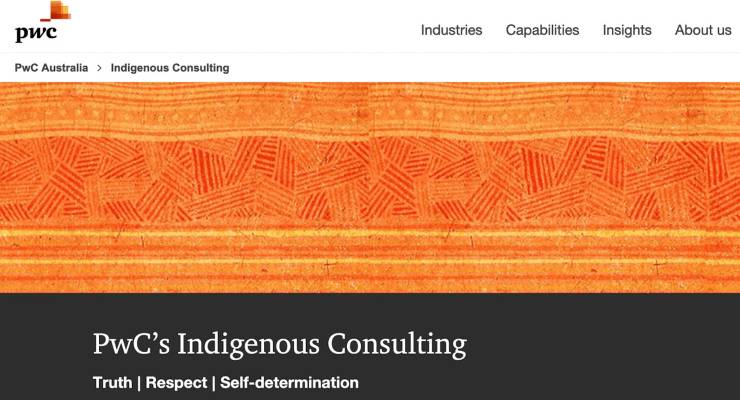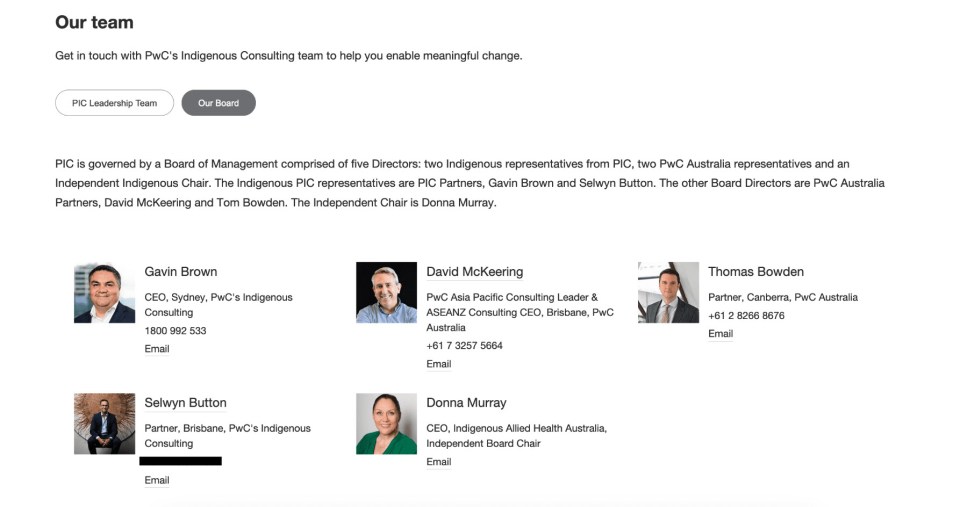
An arm of disgraced consultancy PwC provides “advice to government” on “Indigenous matters” — and has been given more than $44 million in federal government contracts.
The entity, “PwC’s Indigenous Consulting”, provides “advice to government” on “Indigenous matters” and “aims to be an emblem for Indigenous self-determination”, its website says.
It has been extremely — and increasingly — successful in attracting federal government contracts, official filings reveal.
PwC’s Indigenous Consulting has been awarded $44.58 million in federal government contracts since 2015.
In 2022 alone it was given federal contracts of $13.78 million, almost double any other year.
Fueling its success has been more than $14 million in “limited tender” contracts — including more than $10 million awarded under a procurement regime for small Indigenous businesses.
Investigations reveal PwC’s Indigenous Consulting has been given dozens of the “limited tender” contracts, totalling $10.03 million, on the grounds it is an “SME with at least 50% Indigenous ownership”.
The federal government’s procurement register AusTender shows it was given nine “limited tender” contracts just in 2022.
Two of those contracts, totalling $1.125 million, were from the Department of Treasury, with the purpose stated simply as “management advisory services”.
Both filings state: “Limited Tender Exemption … SME (small to medium enterprise) with at least 50% Indigenous ownership”.
The revelations come as Prime Minister Anthony Albanese this week announced October 14 as the date for the referendum on creating an Indigenous Voice to Parliament, which would provide a permanent platform for Indigenous peoples to provide advice to the government on Indigenous issues.

Also among the “limited tender” deals given to PwC’s Indigenous Consulting was a contract awarded by the Department of Social Services in February last year for “policy and program development services”.
It was for exactly “$200,000.00”.
Another Social Services contract was “amended” nine times — each time its value was increased.
Starting at $1.22 million in March 2019, it was ultimately increased to $4.34 million in June 2021.
Each “amendment” — which requires a new contract — is marked “Limited Tender … SME with at least 50% Indigenous ownership”.
PwC is one of the world’s largest businesses.
When The Klaxon approached PwC Australia, spokesman Patrick Lane said PwC’s Indigenous Consulting “is not part of PwC Australia”.
“It is its own entity,” he said.
That’s despite its name, that its directors include PwC Australia partners, that it shares a website with PwC — and that it’s based inside PwC’s offices.
Filings with corporate regulator the Australian Securities and Investments Commission (ASIC) show its full legal name is “PriceWaterhouseCoopers Indigenous Consulting Pty Limited” and that it’s 51% owned by a private company called MAAR Investment Holdings.
The remaining 49% is owned by PwC.
The entity’s address, and its “principal place of business”, is Level 17, 100 Barangaroo Avenue, Barangaroo, NSW — PwC Australia’s headquarters.
It was created in August 2013, shortly after Luke Sayers was appointed PwC Australia CEO.
Sayers was PwC Australia’s CEO from mid-2012 to mid-2020 — the entire tax leaks affair.
PwC has been caught taking secret government data it gleaned while providing “advice” on new laws to prevent multinationals from avoiding Australian tax — and selling it for millions of dollars to multinationals seeking to avoid Australian tax.

It is not possible to determine how much money PwC has made from PwC’s Indigenous Consulting — PwC is refusing to provide us with a copy of its audited accounts.
But it owns 49% of all profits made by PwC’s Indigenous Consulting, including from the $44.58 million in revenue from federal government contracts alone since 2015.
Detailed analysis of the more than 100 AusTender filings for PwC’s Indigenous Consulting since 2015 shows they are extremely similar to those for PwC Australia, which has been given hundreds of millions of dollars a year in federal contracts.
The entries are littered with hefty “amendments” — which almost always heavily increase the originally agreed cost to taxpayers — and they cover a very wide range of “services” provided.
One “limited tender exemption” contract is with the Australian Taxation Office (ATO) for “cloud software services”.
It was initially to cost taxpayers $244,751.49 – but it ended up costing $378,586.49 after an upwards “amendment” of $133,835.39.
The website for PwC’s Indigenous Consulting — at pwc.com.au — states the entity aims to “enable positive change” by providing “advice” on “Indigenous matters”.
“Our aim is to help enable positive change by providing trusted professional services and advice to government, corporate and community clients on Indigenous matters,” it states.

PwC Australia’s Lane directed The Klaxon to PWC’s Indigenous Consulting’s CEO Gavin Brown.
“PwC Indigenous Consulting (PIC) is a separate organisation to PwC Australia — we are a Supply Nation Certified business (i.e. greater than 50% ownership by Indigenous peoples),” wrote Brown.
“We have prioritised our people and purposes before profit, which has enabled us to grow from a start-up of just over a handful of people in October 2013, to a business which is now approximately 75 people, more than 50% of whom are themselves indigenous peoples”.
We asked how much profit the entity had made, and how much went to PwC.
Brown responded: “We have never declared or paid a dividend.”
Whether or not dividends have been paid — that is, whether profits have been drawn down — has no relation to what profits have been earned by the company.
Rather, the profits simply remain in the company until they are drawn down.
PwC Indigenous Consulting is not required to file audited annual accounts with ASIC as it is considered a “small proprietary company” because it has annual revenue of less than $100 million.
That means it’s not possible to determine key information such as how much it paid in executive salaries, what its “related party” dealings are — and how much profit it has accrued.
We asked Brown for a copy of the 2022 audited accounts of PwC’s Indigenous Consulting.
Like PwC Australia, Brown refused.
Brown said PwC’s Indigenous Consulting was “a small Indigenous business”. He said it was “not required to lodge financial statements with ASIC” given it had revenues below $100 million a year.
We said we were aware of this.
We requested the accounts “for the purpose of transparency”, given PwC’s Indigenous Consulting had received tens of millions of dollars of taxpayer funds (including $13.78m just in 2022).
Brown refused.
This article first appeared at The Klaxon and is republished with permission.








Excellent. Of course, just because a mysterious not-PwC-really entity is deeply embedded in PwC (looks like a duck, walks like a duck, and quacks like a duck; but if PwC says it’s not a duck, then who are we to argue) and is getting many millions of dollars from parts of government such the DSS (which did so well with Robodebt over the years) and the ATO (which did so much to facilitate PwC selling to tax-dodgers its access to tax policy development) does not prove there is anything shonky going on here, and the refusal of anyone at PwC to release any financial records or answer questions does not prove it either. So who’s ready to assume it’s probably all very innocent and ok?
I’m surprised Dutton and the NoWhere Mob have not made more of this. We clearly don’t need a Voice by First Nations people because their interests and needs are being monitored, curated and delivered by PwC Indigenous. Might be a question or two about them being the same mob that has been cheating the ATO and Australian taxpayers by their perfidy and lies.
It is obviously a far better model for a Voice; one where oodles of government money can be extracted and poured into capacious corporate pockets, all under proper control of the right sort of people. Rather like the way the government (which party makes no difference) always ‘helps’ the unemployed by handing multi-million dollar contracts to shameless corporate con-artists who pretend to be running programs to get the unemployed into work, but which do little more than pile more misery on to the vulnerable.
Could we try pulling a No-camp swifty and ask for documentary evidence of the Indigeneity of the “more than 50%”?
The further you wade into PwC, the deeper you sink.
Profits are regularly shifted between related companies by sub-contracting staff from one entity to another at an agreed price. No dividends required.
Also the propensity, especially under the LNP under guidance from the usual suspects i.e. IPA, for these sub-contracts to be given to corporate entities while the PS is constrained, a la Franks ‘The Wrecking Crew’:
‘…rise of a ruling coalition dedicated to dismantling government. But rather than cutting down the big government they claim to hate, conservatives have simply sold it off, deregulating some industries, defunding others, but always turning public policy into a private-sector bidding war…..It is no coincidence, Frank argues, that the same politicians who guffaw at the idea of effective government have installed a regime in which incompetence is the rule. Nor will the country easily shake off the consequences of deliberate misgovernment through the usual election remedies. Obsessed with achieving a lasting victory, conservatives have taken pains to enshrine the free market as the permanent creed of state’
Love your work Anthony.
… Are they picking up Mundine?
mining Mundine … oh so no conflicts of interest
I presume you’re joking.
But wait – ?
Could explain a lot regarding all those “Vote No” aboriginals on our TV screens ?
Worth a closer look Crikey ?